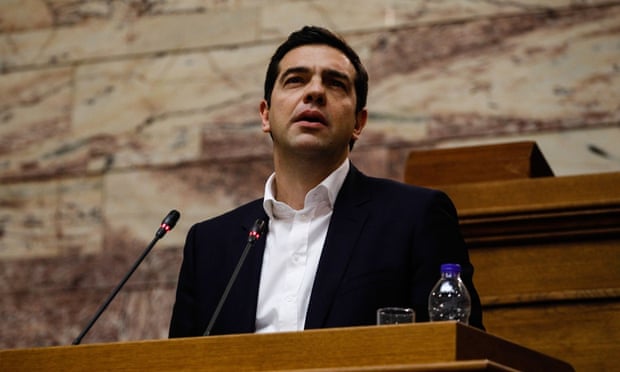Αυτή την
Ελληνική τραγωδία αποκαλύπτει το CNBC σε ένα συγκλονιστικό αφιέρωμα της Λόρης
Ιωάννου, αποκαλύπτοντας το πραγματικό Grexit. Ένα Grexit που χαρίζει το
πολυτιμότερο αγαθό που διαθέτει ένα έθνος, σε άλλα: Το μέλλον του.
Στο αφιέρωμα ξεχωρίζει το αποκαλυπτικό βίντεο –
ιστορικό της κατάρρευσης. Ίσως το πιο αληθινό αφιέρωμα στον δρόμο του ολέθρου που
έστησε ο Σημιτης και ολοκλήρωσε ο Παπανδρέου με τον Σαμαρά, αφού αποκαλυπτει το
σκανδαλο των Ολυμπιακών, των πλαστών στοιχείων της ΟΝΕ, το φιάσκο του
Βατοπαιδίου που χρησιμοποιήθηκε για να έλθει ο Παπανδρέου στην εξουσία, αλλά
και των περιβόητων εταιρειών αξιολόγησης που βοήθησαν τον Παπανδρέου να
υποδουλώσει την χώρα.
Όπως σημειώνεται, «τα στατιστικά στοιχεία για το άρθρο
προέρχονται από την έρευνα του καθηγητή του Πανεπιστημίου Μακεδονίας και
συγγραφέα Λόη Λαμπριανίδη.
«Οι μισοί από τους 160.000 με 180.000 αποφοίτους πανεπιστημίων που έχουν φύγει
από την Ελλάδα, τα τελευταία χρόνια, είναι κάτοχοι διδακτορικού» όπως
σημειώνεται.
Επιπλέον, αντλούνται στατιστικά στοιχεία από την έρευνα της Endeavor Greece και
τη σχετική έκθεσή της, «σύμφωνα με την οποία, 200.000 άνθρωποι εγκατέλειψαν την
Ελλάδα από την αρχή της κρίσης, πριν από πέντε χρόνια».
Όπως τονίζεται, «ένα από τα πλέον ανησυχητικά στοιχεία είναι ότι η τάση για
μετανάστευση δεν έχει υποχωρήσει, ενώ το 46% των Ελλήνων που ζουν στη χώρα
σκοπεύουν να εγκατασταθούν στο εξωτερικό». Όπως σημειώνεται στο δημοσίευμα, «τη στιγμή
που η ΕΕ θέλει την Ελλάδα να ανορθωθεί και να αναδιαρθρώσει την οικονομία της,
η δύναμη της φαιάς ουσίας, που απαιτείται για τη μεταμόρφωση αυτή, φεύγει από
τη χώρα», ενώ σε άλλο σημείο, επισημαίνεται ότι «σημαντικός παράγοντας για τη
φυγή εγκεφάλων είναι ψυχολογικός, σύμφωνα με τον Αλέξη Πανταζή, συνιδρυτή της
Hellas Direct».
Επίσης, αναφέρεται ότι «αυτή η αβεβαιότητα έχει εμποδίσει πολλούς ανθρώπους από
διάφορους τομείς» και «υπάρχει μια αίσθηση παράλυσης και τα πράγματα έχουν
χειροτερέψει μετά τις εκλογές» όπως είπε ο Χάρης Μακρυνιώτης, διευθύνων
σύμβουλος της Endeavor Greece.
Σύμφωνα με το δημοσίευμα, «όπως εξήγησε (ο κ. Μακρυνιώτης), όλοι περιμένουν να
δουν πως θα εξελιχθεί η τετράμηνη παράταση του νέου σχεδίου διάσωσης της ΕΕ και
αν η Ελλάδα θα μείνει στο ευρώ».
Στη
συνέχεια, αναφέρει ότι «η επίπτωση στην καθημερινή ζωή μπορεί να γίνει αισθητή
από όλους» και ότι «οι τράπεζες δεν δανείζουν, κρατώντας τις εγκρίσεις σε
αναμονή. Αυτό σημαίνει ότι για ένα μικρομεσαίο επιχειρηματία δεν υπάρχει
κεφάλαιο κίνησης, τώρα. Και αν είστε ένας επιχειρηματίας που ψάχνει για
κεφάλαια εκκίνησης, οι επενδυτές δεν ανοίγουν το πορτοφόλι τους. Αντ΄ αυτού,
περιμένουν να δουν τι θα συμβεί με το ευρώ, δεδομένου ότι οποιαδήποτε αλλαγή θα
επηρεάσει τις αποτιμήσεις».
«Οι μισοί από τους 160.000 με 180.000 αποφοίτους πανεπιστημίων που έχουν φύγει από την Ελλάδα, τα τελευταία χρόνια, είναι κάτοχοι διδακτορικού» όπως σημειώνεται.
Επιπλέον, αντλούνται στατιστικά στοιχεία από την έρευνα της Endeavor Greece και τη σχετική έκθεσή της, «σύμφωνα με την οποία, 200.000 άνθρωποι εγκατέλειψαν την Ελλάδα από την αρχή της κρίσης, πριν από πέντε χρόνια».
Όπως τονίζεται, «ένα από τα πλέον ανησυχητικά στοιχεία είναι ότι η τάση για μετανάστευση δεν έχει υποχωρήσει, ενώ το 46% των Ελλήνων που ζουν στη χώρα σκοπεύουν να εγκατασταθούν στο εξωτερικό». Όπως σημειώνεται στο δημοσίευμα, «τη στιγμή που η ΕΕ θέλει την Ελλάδα να ανορθωθεί και να αναδιαρθρώσει την οικονομία της, η δύναμη της φαιάς ουσίας, που απαιτείται για τη μεταμόρφωση αυτή, φεύγει από τη χώρα», ενώ σε άλλο σημείο, επισημαίνεται ότι «σημαντικός παράγοντας για τη φυγή εγκεφάλων είναι ψυχολογικός, σύμφωνα με τον Αλέξη Πανταζή, συνιδρυτή της Hellas Direct».
Επίσης, αναφέρεται ότι «αυτή η αβεβαιότητα έχει εμποδίσει πολλούς ανθρώπους από διάφορους τομείς» και «υπάρχει μια αίσθηση παράλυσης και τα πράγματα έχουν χειροτερέψει μετά τις εκλογές» όπως είπε ο Χάρης Μακρυνιώτης, διευθύνων σύμβουλος της Endeavor Greece.
Σύμφωνα με το δημοσίευμα, «όπως εξήγησε (ο κ. Μακρυνιώτης), όλοι περιμένουν να δουν πως θα εξελιχθεί η τετράμηνη παράταση του νέου σχεδίου διάσωσης της ΕΕ και αν η Ελλάδα θα μείνει στο ευρώ».











